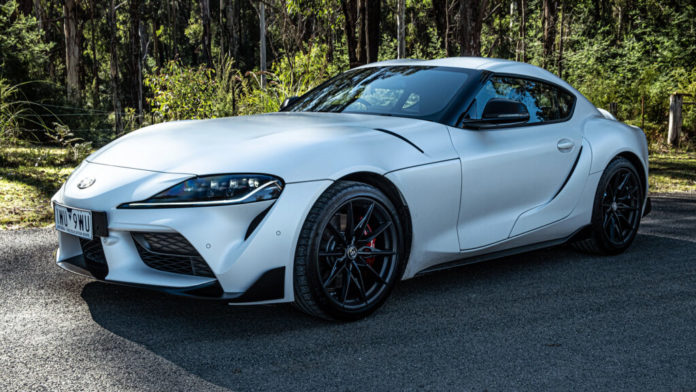I’ve never really agreed with those that feel let down by the A90-generation Toyota Supra. But I completely understand why some don’t like it and why it continues to ruffle feathers.
In the four years since its release, there remain plenty of enthusiasts who simply can’t get over the fact that it was developed alongside BMW and shares many parts with the Z4 and other BMW models. I know people that still say “Oh, nice BMW!” to A90 Supra owners but it’s important to remember that were it not for Toyota’s partnership with BMW, a new Supra likely never would have never been created. And, after all, BMW has a rich history of building incredible sports cars, so what’s the big deal?
SWIPE
Of course, some will say that had Toyota developed the Supra by itself, it would have been better. Were Toyota’s Gazoo Racing division to make a new Supra in 2023, we suspect it could be better but sadly, that’s not the reality we’re living in as when the car was being developed, GR was still focused on motorsport, not road cars like it is now.
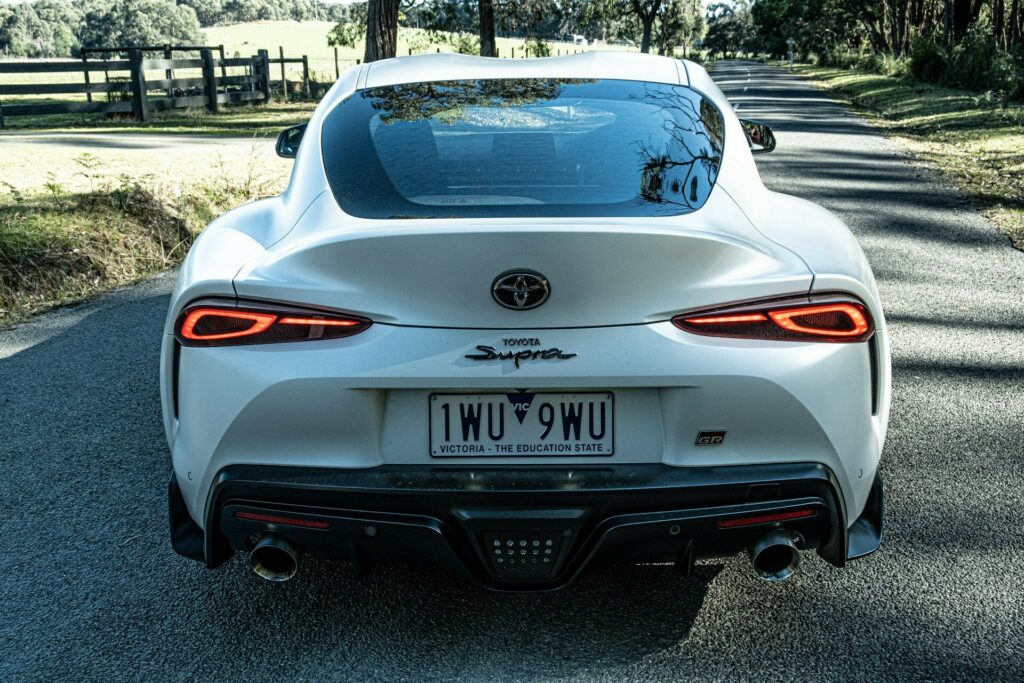
So that brings me to today. All of these thoughts were running through my mind as I picked up the keys to the most enthusiast-oriented version of the new-age Supra, the six-speed manual model. What I found before me was a front-engined, rear-wheel drive sports car with a powerful engine and a stick shift. That sounds like the perfect recipe for success. However, it took more than the first drive for me to fully appreciate just how good this thing is.
Read: Nearly Half Of 2023 Toyota GR Supra Buyers Opted For Manual Transmission
As you probably already know, the Supra is powered by BMW’s B58 3.0-liter turbocharged inline-six and while some markets also have the option of a 2.0-liter turbo-four, Australia only gets the 3.0-liter. This engine is superb and pumps out an impressive 285 kW (382 hp) and 369 lb-ft (500 Nm) of torque and for the first few years of the car’s production run, was exclusively paired to a ZF eight-speed automatic transmission.
Then came along the six-speed manual. This is the car that many car enthusiasts had been waiting for and it is certainly the better of the two options. The gearbox takes the form of a modified ZF system that includes a new clutch and tweaked linkages. As we found out, it also adds a whole new thrill to driving the Supra.
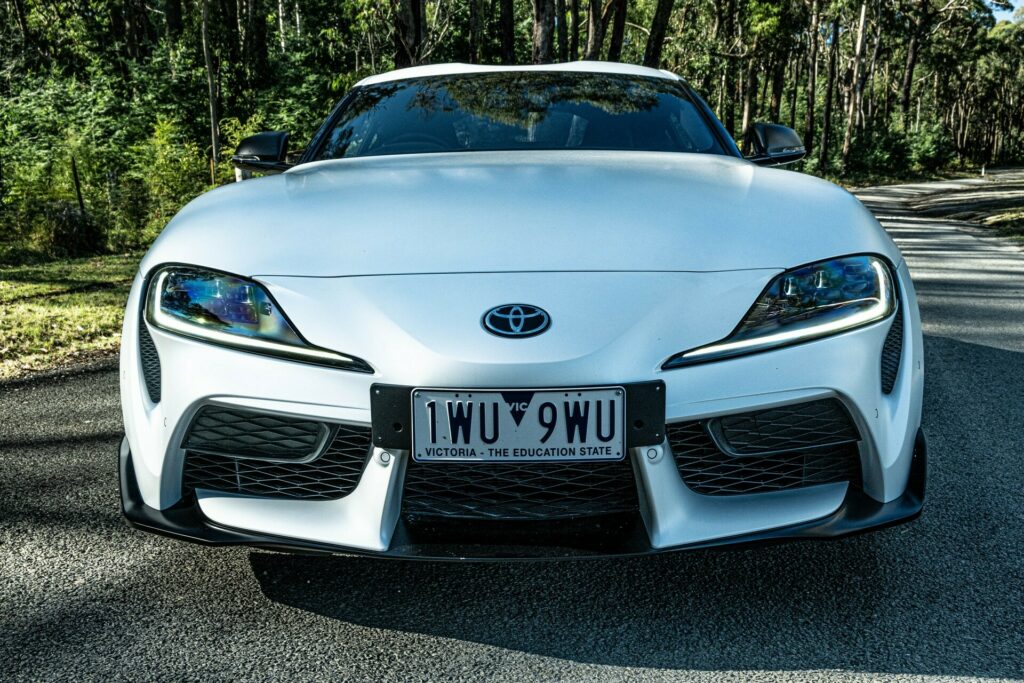
Two versions of the Supra are sold in Australia. The entry-level model, priced from AU$96,101 ($61,514) including on-road costs, is dubbed the GT and is very well-equipped. In addition to coming with the choice between the eight-speed auto and the six-speed manual, it lands with 18-inch alloy wheels, adaptive suspension, seven airbags, an 8.8-inch digital instrument cluster, safety systems like Pre-Collision Safety with daytime pedestrian and cyclist detection, and 10-speaker audio system.
Our test car was the Supra GTS. It starts at AU$106,015 ($67,860) and adds 19-inch forged alloy wheels, a head-up display, and a 12-speaker JBL audio system. It can also be optioned with tan leather-accented seat trim or black Alcantara seat trim in addition to the black leather that is the sole option on the GT. The Matte White paint of our test car, as well as Nurburg Matte Grey, are offered exclusively on the GTS and add AU$2,050 ($1,312) to the sticker price.
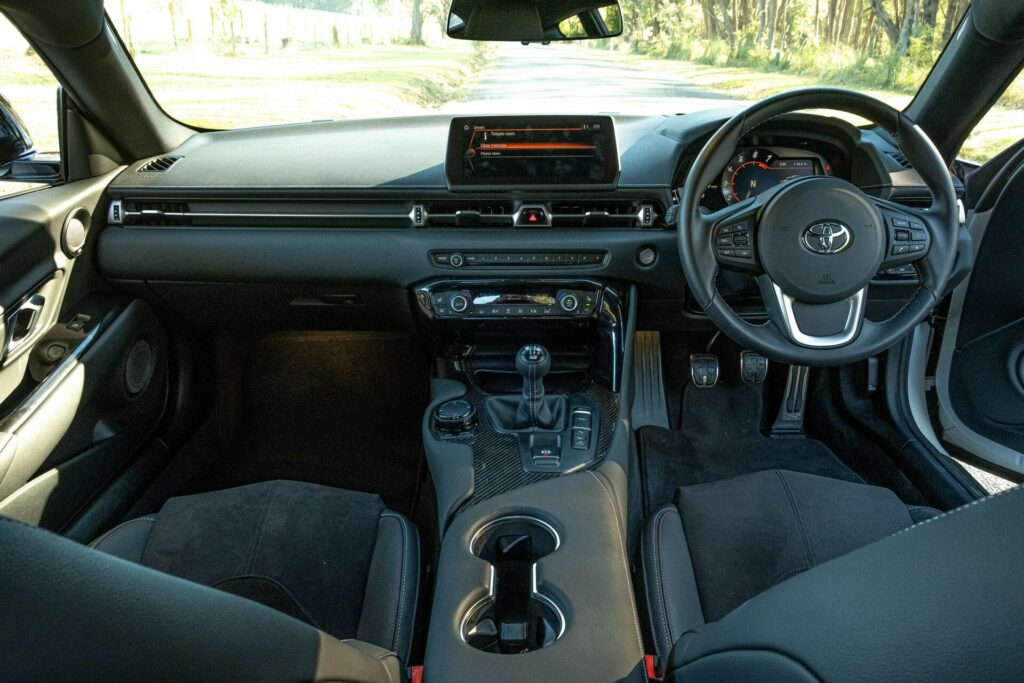
Toyota’s nicest cabin
Stepping into the Supra for the first time I was quickly reminded of just how compact the cabin feels. You sink down into the excellent GR sports seats and get a good view of the road but with everything finished in black, it can feel a little claustrophobic and is certainly tighter than the interior of the new Nissan Z.
The gear shifter immediately caught my eye. It is small and looks a little dainty when compared to the shifters of the GR Yaris and GR Corolla but feels premium and is nicely weighted (more on that later). The rest of the cabin is familiar with the automatic Supra and plenty of BMW models too.
Read: I Drove A 2020 Toyota GR Supra GTS For A Week, Here’s What I Think About It
Sitting atop the dashboard is an 8.8-inch infotainment display with BMW’s iDrive software and those who hate touchscreens will be pleased to know it can also be operated with a controller on the transmission tunnel. It’s nice that the Supra retains physical buttons and knobs for the HVAC system and the inclusion of a wireless smartphone charger with a little cradle to keep your phone secured is also most welcome. The cabin is absolutely more premium than that of the new Nissan Z.
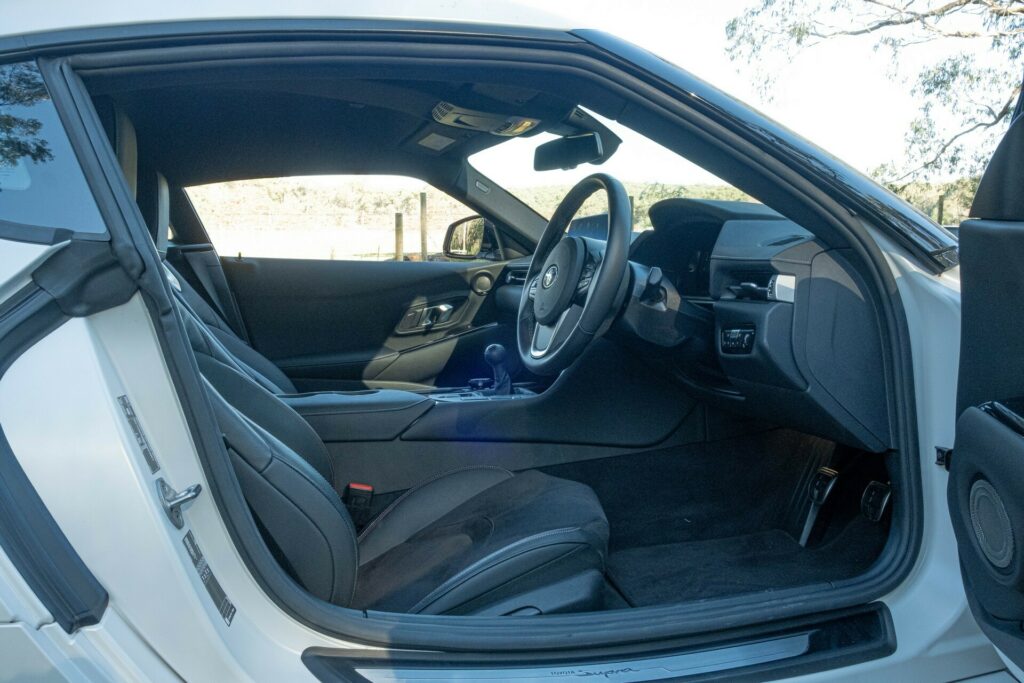
Fun, sporty, and poised
But, let’s be honest, you don’t really care about the interior of the Supra, do you? What you really want to know is how it drives, right? Well, we’re happy to report that the six-speed Supra is an absolute joy to drive and to live with.
I wasn’t so sure during my first 20 minutes with the car, however. After slotting the car into first gear and pulling away, I was surprised by how light the clutch is and how high the engagement point is, especially compared to the GR Corolla I drove just a few weeks prior. I was also taken aback by just how light and undramatic the shifting action is. Toyota says the Supra has a 200-gram gear knob but it doesn’t really feel like it. The shifting action is a far cry from that of the Nissan Z where you feel like you’re getting an arm workout every time you drive. It is also less notchy than the six-speeds used in other GR products.
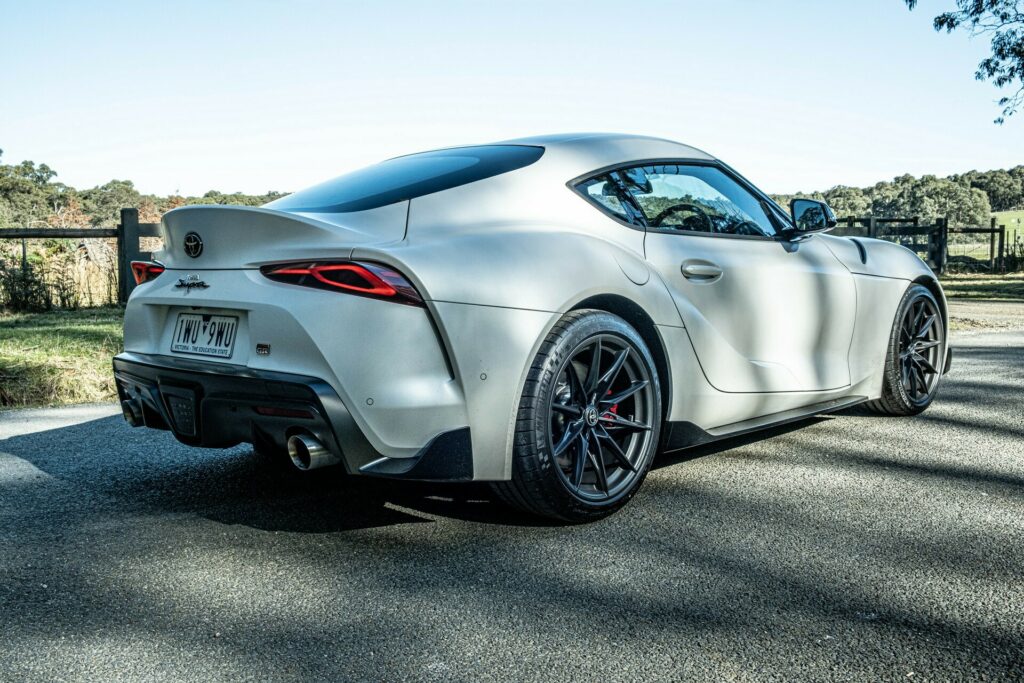
In the GR Corolla, the engagement point feels like it is just a few millimeters off the floor, allowing you to slam it through the gears without a care in the world. The six-speed of the Supra requires a little more finesse and on more than one occasion I found myself inadvertently riding the clutch while making a change. Once I got used to the unique feel of the gearbox is when I really started to feel at home in the Supra.
The thrill of driving – in a Toyota
The 3.0-liter engine pulls strongly throughout the entire rev range and while it does not feel as muscular as the twin-turbo V6 of the Z, it makes for a very quick car and one that can hit 100 km/h (62 mph) in around 4.2 seconds.
The Supra really begins to pull away from the Z from a dynamic standpoint. While the Z is newer, there’s no doubt that the Toyota has it beat in the handling stakes. Equipped with a sticky set of Michelin Pilot Super Sport tires, our GTS test car offered superb levels of grip and a particularly responsive front end. It feels light on its feet through corners and while it is quite powerful, the rear-end isn’t particularly frisky like it is in the Z.
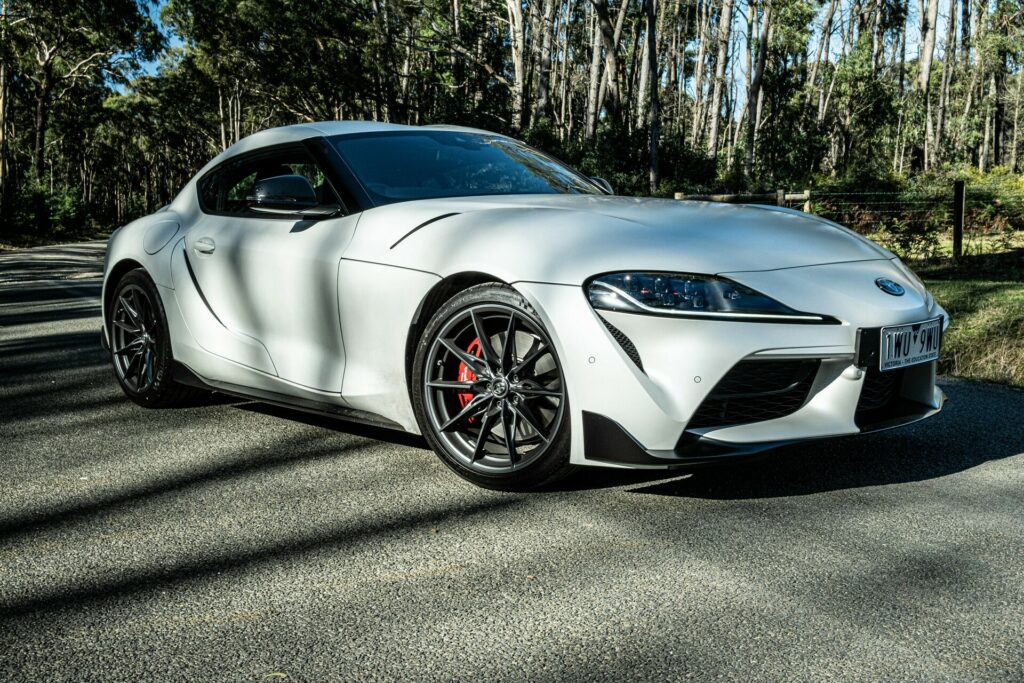
It feels like an altogether better-sorted and more premium option to the Nissan for those seeking an out-and-out sports car. It’s not a bad daily driver either. The automatic rev-matching system works very well as do the strong brakes.
Our test car was lacking a little in the sound department. When we first tested the Supra at the start of 2020, the exhaust cracked and popped feverously when it was in Sport mode. Not the case here. In fact, the best we got was some burbles, a fry cry from the gunshot shots we were expecting. According to the internet, 2020MY Supra models sounded the most manic of them all, and the six-speed simply isn’t as loud as the auto. Shame.
We were pleasantly surprised with the fuel efficiency of the Supra. Toyota’s official claim is that it consumes 8.9l/100 km (26 U.S. MPG) over the combined cycle and while we did not average that given we did quite a lot of sporty driving, the Supra will happily sit at 8.0l/100 km (29.4 mpg) at highway speeds.
All told, the 2023 Toyota GR Supra GTS with the six-speed is a brilliant sports car. While we think it could have been even better if its transmission was more similar to that of the GR Corolla, it remains infinitely more enjoyable to use than the eight-speed automatic.

